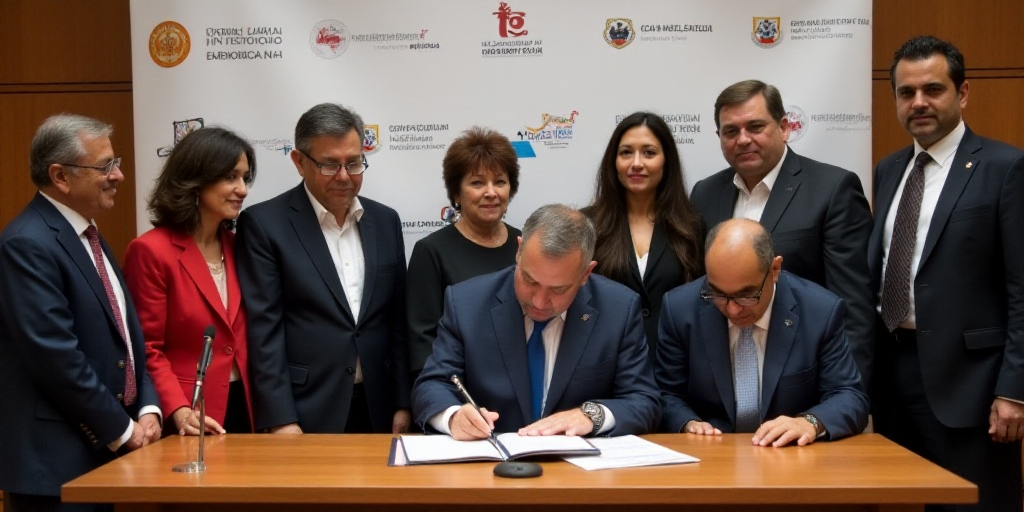Introduction to the Changing Mining Landscape in Mexico
Marcelo Ebrard, the Secretary of Economy in Mexico, has emphasized that the current administration should give a significant boost to the mining industry due to global geopolitical changes. This shift in policy reflects a departure from the previous administration’s stance, now actively promoting this industry.
Ebrard’s Statement at the Mining Convention
During the signing of the Convenio de Colaboración del Comité Educativo de Minería México 2025 at the Secretariat of Economia in Mexico City, Ebrard succinctly summarized the situation: “You suddenly become fashionable.”
Geopolitical Context and Mineral Dependence
Ebrard highlighted that just a few years ago, there was no geopolitical rivalry but rather a superpower and an agreement on free trade and institutions born from the Second World War. He then pointed out that, without naming China directly, “we cannot assume that we can easily obtain all the minerals our industry needs in a world with such high geopolitical tension.”
Mexico, for instance, exports copper minerals but imports refined copper, a critical metal for the country’s automotive industry. Ebrard stressed the need to “scale up” and “upgrade” Mexico’s mining capabilities, urging legislators, governors, academics, mining businesspeople, mining engineers, metalurgists, geologists, and students to support this initiative.
China’s Mineral Strategy and Global Influence
According to a U.S. Congress analysis, China has prioritized its mineral and critical materials policy for decades. Some experts conclude that China prioritized critical minerals and rare earth elements as early as 1992.
Although China has substantial reserves of certain minerals and rare earth elements within its geographical boundaries, it has strategically invested through its Belt and Road Initiative (BRI) in infrastructure and manufacturing capabilities in other countries. This strategy allows China to import raw minerals from various nations for processing and refinement, becoming a global leader in refining nickel (68%), copper (40%), lithium (59%), and cobalt (73%).
China’s BRI has specifically invested in critical minerals in countries like the Democratic Republic of Congo (DRC) and Indonesia. The DRC supplies 68% of the world’s cobalt, with Chinese companies controlling 80% of its cobalt production. These companies then ship the cobalt to China for processing and distribution worldwide.
China also finances mineral development in Indonesia, controlling 82% of nickel battery production by 2024 through Chinese-owned companies.
Mexico’s Mining Future and Collaborative Efforts
Following the event, Sonora Governor Alfonso Durazo commented to the press that the establishment of the Mining Educational Committee would successfully address challenges posed by the energy transition.
“This committee brings together efforts from the federal government, mining state governments, the mining industry, and national higher education centers,” Durazo said.
Zacatecas Governor David Monreal mentioned that Ebrard set a broad agenda with investment, development, federal entity participation, scientific attention, and involvement of the powers as key elements.
Ebrard concluded by stating that the government’s goal is to enable litium production in Mexico as soon as possible.
Key Questions and Answers
- What is the main topic discussed by Marcelo Ebrard? Ebrard emphasized that the Mexican mining industry should receive greater promotion due to global geopolitical shifts.
- Why is Mexico’s mining industry significant? Mexico exports copper minerals but imports refined copal, crucial for its automotive industry. Ebrard stressed the need to upgrade Mexico’s mining capabilities.
- How has China influenced the global mineral market? Through strategic investments via its Belt and Road Initiative, China has become a major player in refining nickel, copper, lithium, and cobalt. Chinese companies control significant portions of mineral production in countries like the DRC and Indonesia.
- What is the significance of the Mining Convention in Mexico? The convention aims to unite federal, state, and industry efforts to address challenges posed by the energy transition and enhance Mexico’s mining sector.
- What are the government’s goals regarding Mexico’s mining industry? The government aims to enable litium production in Mexico as soon as possible.






